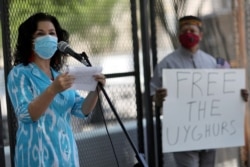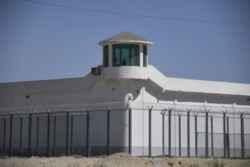Uighurs who were once detained in internment camps in China’s Xinjiang region say they have been sexually abused and raped during interrogations by Chinese authorities, while also witnessing other fellow detainees being raped.
Tursunay Ziyawudun, a 42-year-old Uighur women’s camp survivor who now lives in the U.S. state of Virginia, told VOA that she was beaten, sexually abused and gang raped during interrogations in an internment camp in Kunes county in northern Xinjiang in 2018.
International rights groups estimate that over one million Uighurs and other Turkic-speaking minority groups in Xinjiang have been held in internment camps since early 2017.
In leaked internal government documents, China has called such facilities “transformation through education centers” aimed at “washing brains, cleansing hearts, strengthening righteousness and eliminating evil,” and later described them internationally as “vocational training centers” to “counter terrorism and religious extremism.”
Ziyawudun’s story was first reported by the BBC last week.
Ziyawudun and her husband, an ethnic Kazakh, both natives of Xinjiang, first moved to neighboring Kazakhstan to open a medical clinic in 2011.
But in November 2016, when they returned to China, local officials in Xinjiang seized their passports and in April 2017 sent Ziyawudun to an internment camp for “reeducation” for traveling to and living in Kazakhstan, one of 26 countries Chinese authorities in Xinjiang deem sensitive.
After several weeks, Ziyawudun was released from the camp, and in June 2017, the police released her husband’s passport, allowing him to go to Kazakhstan for two months while keeping Ziyawudun in China as a guarantee for his return to Xinjiang without engaging in any “anti-China activities” in Kazakhstan.
Her husband didn’t return to China as Chinese authorities had demanded, and in March 2018 as a punishment for his decision, Ziyawudun for the second time was taken into the internment camp where she witnessed what she called “the most barbaric and inhumane sexual abuses against [me] and other cellmates.”
“On four different occasions, I was taken to an interrogation room, where I was beaten, my private part was electrocuted unbearably by an electric baton and I was gang raped,” Ziyawudun told VOA, adding that some of her fellow detainee women never came back to the cell after their visit to the interrogation room, and the ones who returned were asked to keep quiet or face consequences.
In December 2018, after nine months in the camp, Ziyawudun was released. She said the Chinese authorities freed her under pressure because of her husband’s campaigning in Kazakhstan.
In September 2019, the Chinese government allowed her to travel for only one month to Kazakhstan to stay with her husband. In Kazakhstan, her application for asylum was denied, but she was able to remain with family despite the constant risk of sudden deportation back to China. By September 2020, the U.S. government allowed her to come to the United States.
China’s foreign ministry spokesperson Wang Wenbin said last week that Ziyawudun’s rape claim “has no factual basis at all.”
U.S. officials say, “these atrocities shock the conscience and must be met with serious consequences.”
“We are deeply disturbed by reports, including first-hand testimony, of systematic rape and sexual abuse against women in internment camps for ethnic Uighurs and other Muslims in Xinjiang,” a U.S. State Department spokeswoman said in a statement last week.
Not a new phenomenon
Sexual violence against Uighur women in China is not a new phenomenon, says Zubayra Shamseden, Chinese Outreach Coordinator at the Washington-based Uyghur Human Rights Project.
“Due to the restrictive environment, fear of retaliation by the Chinese government against other family members and social connections and due to cultural sensitivity, many victims of sexual violence, torture and abuse by Chinese authorities were unable to speak out,” said Shamseden, who has previously interviewed other Uighur women who were sexually abused and tortured during detention in China.
According to Maya Wang, a senior China researcher at Human Rights Watch, the combination of a strong power imbalance between the Han-Chinese and Uighurs, fetishization of Uighur women in the popular imagination, corruption and the state encouragement of inter-ethnic romance create an environment in which Uighur women and children are at risk during the crackdown.
“But as to the extent to which sexual violence is systematically perpetuated against Turkic Muslim women in Xinjiang, Human Rights Watch is unable to ascertain due to the hidden nature of such abuses,” Wang told VOA.
Rape in other camps
Qelbinur Sidiq, a 51-year-old woman who in 2017 taught Mandarin at two male and female detention camps in Urumqi, the capital city of Xinjiang, says that one of her female police officer friends discussed with her the raping and sexual abuses against detained Uighur women by male Chinese police officers.
“When my police friend told me the horrific details of sexual abuses and rape of Uighur women in the camps by Chinese policemen, and how it has become a normal topic for conversation over dinner among Chinese camp police, I couldn’t stop crying,” said Sidiq, who has been living in the Netherlands since October 2019.
Because camps in Xinjiang are closed spaces under tight physical surveillance with little chance for external communication, Vanessa Frangville, a China studies professor at the University Libre of Brussels, says it is very likely that many inmates have been victims of sexual assault or rape.
“Such allegations are obviously consistent with a series of right abuses that have been committed with complete impunity in China, not just in Xinjiang,” Frangville told VOA.
“Tibetan nuns, for instance, have reported on several occasions systematic rape during their time in prison, so did several testimonies from Chinese prisons and ‘reeducation’ camps,” she said, referring to Falun Gong detention facilities Beijing has operated since the late 1990s.
Men raped
In 2013, Abduweli Ayup, a 48-year-old Uighur linguist who now lives in Norway, spent 15 months in jail for advocating the use of Uighur language in Xinjiang schools.
He alleges he was raped during his first interrogation and later witnessed other Uighur cellmates being raped before or after they were interrogated.
“After I never gave in to their demands for confession to the ‘crimes’ I never committed, such as being ‘a separatist and a spy for the U.S.,’ they shocked me with an electric stick, and later, under the observance of four police, I was transferred to another room and ordered to be raped by Chinese men who wore striped prison uniforms,” Ayup told VOA, adding that the rapes were carried out systematically to intimidate and coerce Uighur prisoners into making forced confessions.
Adrian Zenz, a senior fellow of China studies at the Victims of Communism Memorial Foundation in Washington, told VOA that these allegations of rape could open new categories for crimes against humanity and provide additional evidence of genocide.
“This should bring real and strong sense of international urgency to the crisis which has been taking place in Xinjiang,” he said.







